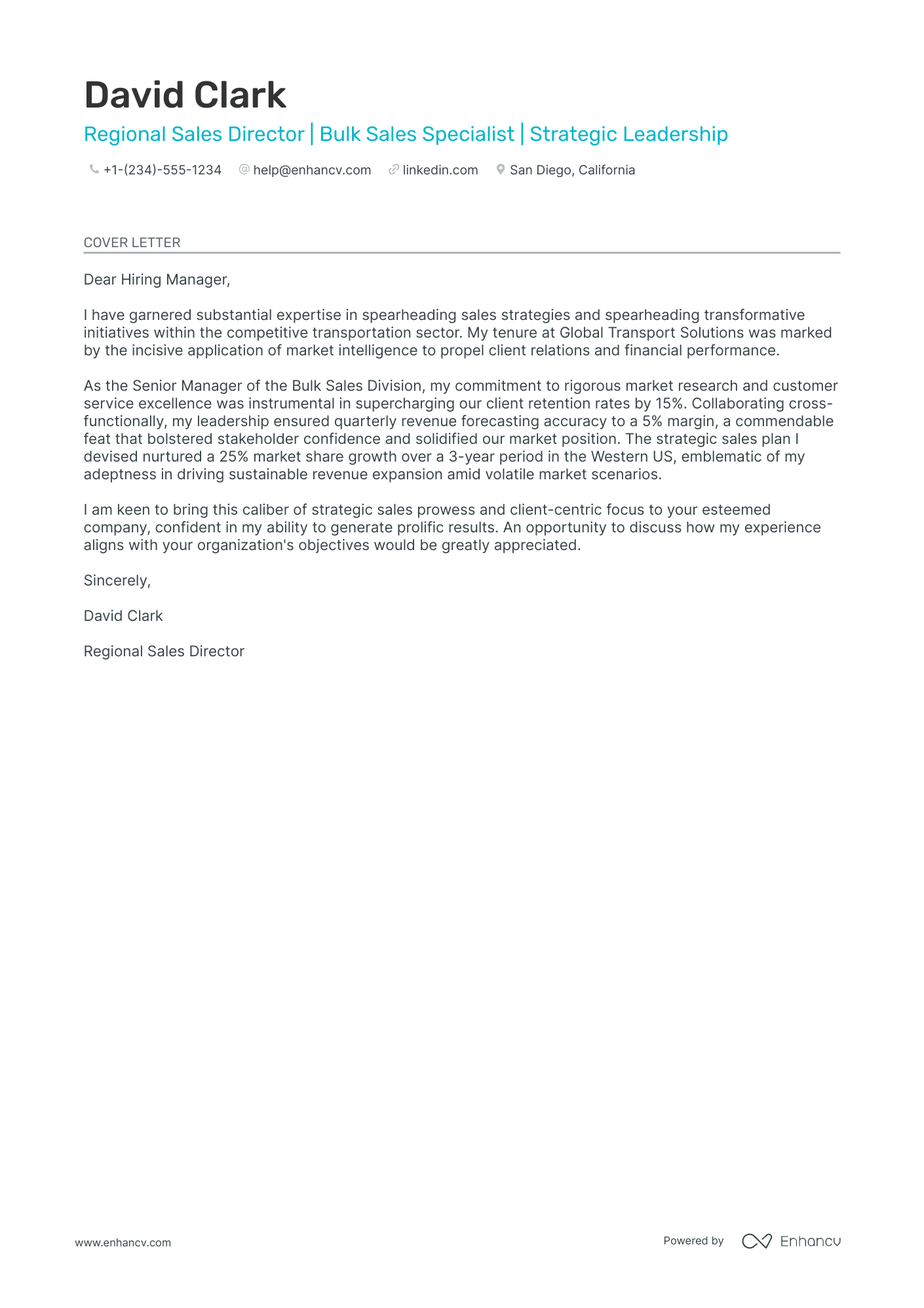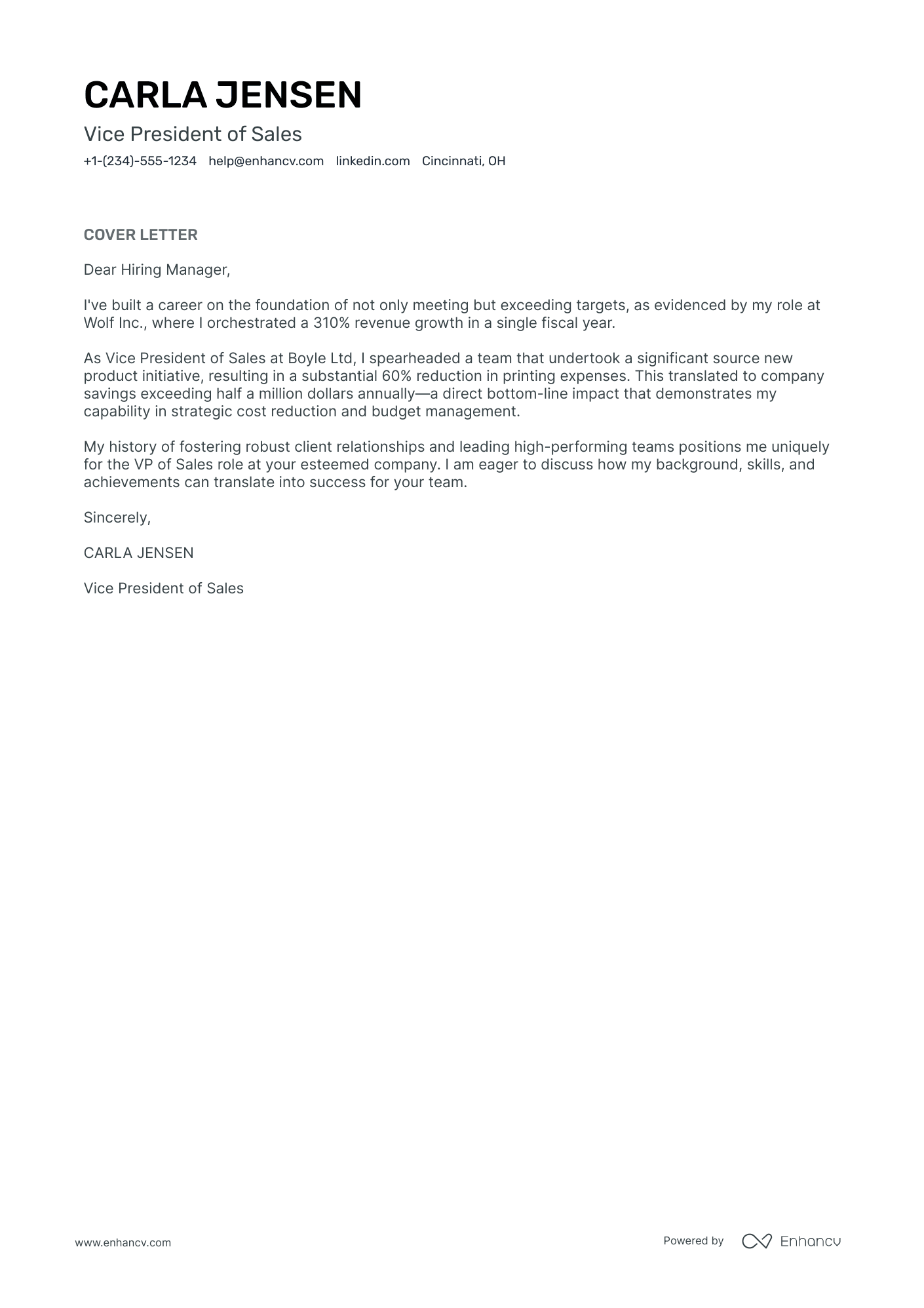Crafting a persuasive sales director cover letter can be a stumbling block, even if you’re well into your job hunt. It's not just an echo of your resume; it's your chance to spotlight a standout achievement and share the story behind it. Striking the right balance between formal tone and originality—while dodging clichés—can feel daunting. And fitting it all onto one page? That's the real art. Let’s unravel how you can master this essential piece of your application puzzle.
- Writing the essential sales director cover letter sections: balancing your professionalism and personality;
- Mixing storytelling, your unique skill set, and your greatest achievement;
- Providing relevant (and interesting) information with your sales director cover letter, despite your lack of professional experience;
- Finding the perfect format for your[ sales director cover letter, using templates from industry experts.
Leverage the power of Enhancv's AI: upload your resume and our platform will map out how your sales director cover letter should look, in mere moments.
If the sales director isn't exactly the one you're looking for we have a plethora of cover letter examples for jobs like this one:
- Sales Director resume guide and example
- Customer Service Supervisor cover letter example
- Car Salesman cover letter example
- Sales Agent cover letter example
- Regional Sales Representative cover letter example
- Insurance Agent cover letter example
- Customer Support Engineer cover letter example
- Cashier cover letter example
- Entry-Level Customer Service cover letter example
- District Sales Manager cover letter example
- Retail Salesperson cover letter example
Drop your resume here or choose a file.
PDF & DOCX only. Max 2MB file size.
Sales director cover letter example
ISABELLE TODD
Detroit, MI
+1-(234)-555-1234
help@enhancv.com
- Highlighting Key Accomplishments: Mentioning a specific achievement such as leading a strategic technical system upgrade and its impact on cost savings demonstrates quantifiable success and an ability to deliver results that are directly aligned with organizational goals.
- Relevant Experience: Tailoring experiences to match the exact role, such as expanding sales departments and increasing profits, showcases suitability and an understanding of the Sales Director position requirements.
- Proactive Communication: Offering to discuss in detail how one’s experiences and skills can benefit the team indicates a readiness to engage and a proactive approach to the application process.
- Conciseness and Clarity: Keeping the cover letter concise and to the point, while covering important aspects like past achievements, personal skills, and an invitation to interview, ensures the content is impactful and easily digestible for the hiring manager.
What are the basics of the design or format of your sales director cover letter?
To start, here's a reminder for you: the Applicant Tracker System (or software that is used to assess candidate profiles), won't be reading your sales director cover letter.
Recruiters enjoy reading sales director cover letters with a standardized format that uses:
- the same font as the resume (e.g. modern ones like Raleway or Volkhov are prefered over the clichéd Times New Roman or Arial);
- single spacing to keep the content concise and organized (this is all ready for you in our cover letter templates);
- a one-inch margin to wrap around the text, like in our cover letter builder;
- PDF as a file format, as it allows your design (and visual element) to stay the same.
Finally, we can't go on without mentioning the key sections of your sales director cover letter.
In the top one-third, make sure to include a header (with your contact information, name, role, and date), a salutation, and an introduction.
Next, follows the heart and soul of your sales director cover letter or its body.
End your sales director cover letter with a closing paragraph and, if you wish, a signature.
Overwhelmed by cover letters? Our free cover letter generator lets you make one in seconds based on your resume.
The top sections on a sales director cover letter
- Header with Contact Information: Include your name, address, phone number, and email address to ensure the recruiter can easily reach out to you for an interview and to present a professional appearance that aligns with a sales director's need for strong communication skills.
- Opening Greeting: Address the letter to a specific individual if possible, as personalizing the cover letter shows you’ve done your research and are proactive, characteristics crucial for a sales director.
- Introduction: State the role you’re applying for, how you learned about the opportunity, and give a brief highlight of your most relevant experience, as this sets the stage for your candidacy and demonstrates that you understand the importance of making a strong first impression, much like in sales.
- Sales Leadership and Achievements: Discuss your past leadership roles, sales successes, and how you’ve met or exceeded targets, because quantifiable achievements provide concrete proof of your ability to lead a team to meet company goals.
- Closing and Call to Action: Thank the reader for their time, express your enthusiasm for potentially discussing how you can contribute to their team in greater detail, and invite them to contact you, reflecting the assertiveness and closing skills necessary in a successful sales director.
Key qualities recruiters search for in a candidate’s cover letter
- Proven track record of meeting or exceeding sales targets: Demonstrates the ability to drive revenue and the effectiveness of the candidate's sales strategies.
- Leadership and team management experience: Essential for guiding and motivating a sales team to achieve collective goals.
- Strategic thinking and business acumen: Shows the ability to craft long-term sales strategies that align with the company's objectives and adapt to market trends.
- Strong interpersonal and communication skills: Important for building relationships with clients, stakeholders, and for leading a sales team effectively.
- Deep understanding of the industry and market: Indicates that the candidate is knowledgeable about the competitive landscape and can identify opportunities for growth.
- Experience with CRM and analytics tools: Reflects the candidate's capability to leverage technology to track sales performance and make data-driven decisions.
The sales director cover letter salutation: how to address hiring managers
After covering the format of your sales director cover letter, let's look at the salutation.
Back in the day, the cordial "To whom it may concern" or "Dear Sir/Madam", might have worked out fine.
But, nowadays, your cover letter should approach hiring managers on a more personal basis.
So, what to do about your cover letter salutation?
If you've messaged the recruiters and are on a first name basis or a more formal one, use the hiring manager's name in the greeting (e.g. "Dear Sophie," "Dear Ms. Givens", or "Dear Mr. Everett,").
Always aim to make the effort to find out the name of the hiring manager, who'd be assessing your application. Search on LinkedIn, double-check the advert on the corporate website, or message the brand on social media to find out more about the role.
If you can't find the hiring manager's name (and still want to sound professional), use "Dear HR Team,", "Dear Hiring Manager,", or the likes.
List of salutations you can use
- Dear Hiring Manager,
- Dear [Company Name] Team,
- Dear [Department Name] Department,
- Dear [Full Name of Recipient],
- Dear Mr./Ms. [Last Name],
- Dear Search Committee,
Your sales director cover letter intro: showing your interest in the role
On to the actual content of your sales director cover letter and the introductory paragraph.
The intro should be no more than two sentences long and presents you in the best light possible.
Use your sales director cover letter introduction to prove exactly what interests you in the role or organization. Is it the:
- Company culture;
- Growth opportunities;
- Projects and awards the team worked on/won in the past year;
- Specific technologies the department uses.
When writing your sales director cover letter intro, be precise and sound enthusiastic about the role.
Your introduction should hint to recruiters that you're excited about the opportunity and that you possess an array of soft skills, e.g. motivation, determination, work ethic, etc.
What to write in the body of your sales director cover letter
Now that you've got your intro covered, here comes the heart and soul of your sales director cover letter.
It's time to write the middle or body paragraphs. This is the space where you talk about your relevant talent in terms of hard skills (or technologies) and soft (or people and communication) skills.
Keep in mind that the cover letter has a different purpose from your sales director resume.
Yes, you still have to be able to show recruiters what makes your experience unique (and applicable) to the role.
But, instead of just listing skills, aim to tell a story of your one, greatest accomplishment.
Select your achievement that:
- covers job-crucial skills;
- can be measured with tangible metrics;
- shows you in the best light.
Use the next three to six paragraphs to detail what this success has taught you, and also to sell your profile.
Ending your sales director cover letter to avoid "sincerely yours"
Yes, this sort of closing statement may work best before your signature.
But you want to give recruiters something more with your sales director cover letter ending.
Some professionals choose to go down the path of promises. In a single sentence, they map out what they'd bring about to the role (whether that's a particular technical skill set or personal traits).
Others, decide to be more concrete by thanking recruiters for their time and prompting for their next interview.
Whatever path you choose, remember to always be polite and respectful of the opportunity you've had. Good manners go a long way.
Which story should you tell in your sales director cover letter when you have zero experience
Candidates, lacking professional experience in the field - this one is for you.
Your sales director cover letter is an exercise of integrity, honesty, and, above all, spinning a positive narrative around your strengths.
And what better way to capture recruiters' attention than with your most job-relevant achievement (this could be from your internship or volunteering experience)?
Make sure to back up your success with transferrable skills that are relevant to the job (e.g. how your year, studying abroad, has taught you to be more motivated and handle multicultural environments).
Another safe card you can bet on is your career dream: in the body of your sales director cover letter, go into the details of how your ambitions would help make the company you're applying for better.
Key takeaways
Writing your sales director cover letter doesn't need to turn into an endless quest, but instead:
- Create an individual sales director cover letter for each role you apply to, based on job criteria (use our builder to transform your resume into a cover letter, which you could edit to match the job);
- Stick with the same font you've used in your resume (e.g. Raleway) and ensure your sales director cover letter is single-spaced and has a one-inch margin all around;
- Introduce your enthusiasm for the role or the company at the beginning of your sales director cover letter to make a good first impression;
- Align what matters most to the company by selecting just one achievement from your experience, that has taught you valuable skills and knowledge for the job;
- End your sales director cover letter like any good story - with a promise for greatness or follow-up for an interview.
Sales Director cover letter examples
By Role






